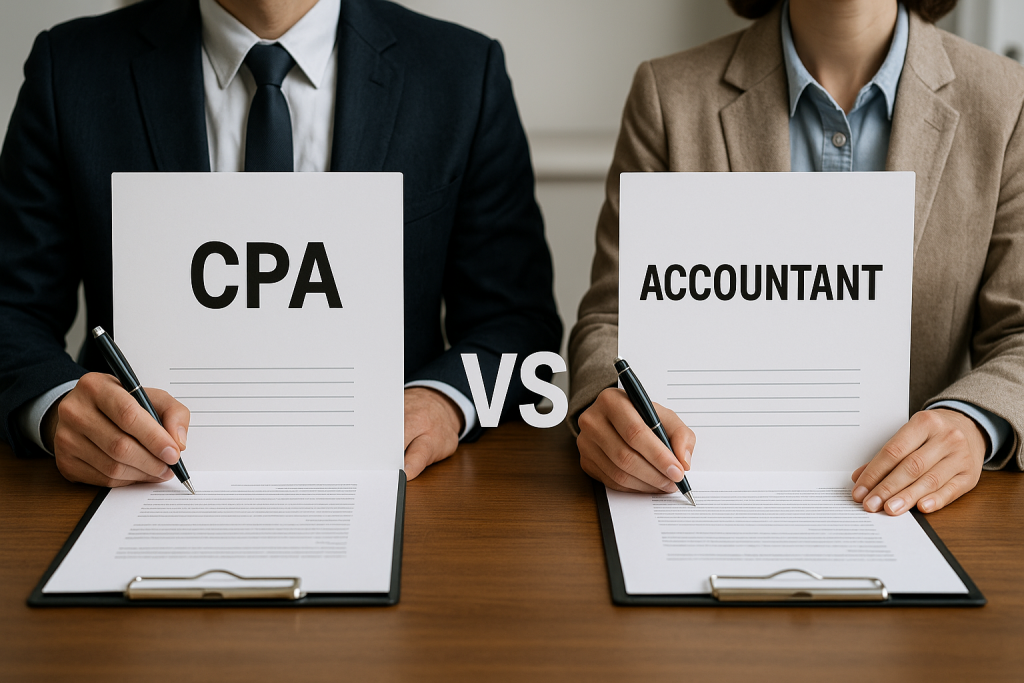
“Accountant” is a broad term; CPA (Certified Public Accountant) is a licensed credential with specific education, exams, and ethical standards. Both can prepare returns and advise on finances—but their scope and legal privileges differ. At Henriquez Accounting & Tax Services, we match your needs with the right expertise. Explore our Bookkeeping, Tax Preparation, IRS Representation, and Outsourced Controller/CFO.
Quick Comparison
| Criteria | CPA | Accountant (non-CPA) |
|---|---|---|
| Credentialing | State-licensed; 150 college credits (varies by state); Uniform CPA Exam; experience; ongoing CPE. | May hold an accounting degree or certificate; no state CPA license required. |
| Scope of Services | All accounting and tax services plus assurance (audits, reviews, compilations), complex advisory, some attest-only tasks. | Bookkeeping, financial statements (non-attest), management reporting, tax preparation/advice (varies by jurisdiction). |
| Legal Privileges | Authorized to sign audit reports and perform attest services; unlimited representation before IRS. | No attest authority; IRS representation varies by credential (e.g., EAs/attorneys have unlimited rights). |
| Best For | Businesses needing assurance, complex transactions, or broad finance + tax strategy. | Small businesses needing day-to-day accounting, monthly closes, and standard tax prep. |
When Should You Choose a CPA?
- You require an audit, review, or compilation for lenders/investors.
- You’re navigating complex transactions (M&A, equity, revenue recognition) or GAAP reporting.
- You want a single advisor for assurance + tax + strategic finance.
When Is an Accountant Enough?
- You need monthly bookkeeping, reconciliations, and clean financials.
- Your tax situation is straightforward and doesn’t require attest services.
- You’re optimizing processes, cash flow, and KPI reporting without formal assurance.
What You’ll Get With Henriquez Accounting
- Accurate, audit-ready books every month.
- Quarterly tax projections and estimate vouchers with due dates.
- Return preparation (business + individual) and 1099 compliance.
- IRS & state representation: notices, audits, payment plans, penalty relief.
- Executive dashboard: cash runway, margins, and tax-ready KPIs.
CPA vs. Accountant—How We Help You Decide
We start with a quick discovery call, review your goals and compliance needs, and recommend the most efficient engagement—CPA-level assurance when required, or accountant-led monthly accounting with integrated tax planning. Either way, your books, taxes, and cash flow work in sync.
FAQs
Do I always need a CPA?
Not always. If you need audits/reviews/compilations or complex advisory, choose a CPA. For standard bookkeeping, management reporting, and many tax engagements, a skilled accountant may be sufficient.
Can an accountant file my taxes?
Yes—many accountants prepare returns. For complex structures or multi-state issues, a CPA (or EA) may add value.
Who can represent me before the IRS?
CPAs, EAs, and attorneys have unlimited representation rights. Other preparers have limited rights.
Is there a cost difference?
Typically, CPA-led assurance and complex advisory cost more due to licensing and attest requirements. Accountant-led work can be more cost-effective for routine accounting and tax preparation.
Can your firm handle both?
Yes. We provide monthly accounting, tax planning/prep, and IRS representation—and coordinate CPA-level services when required.
Ready to choose the right fit?
Whether you need CPA assurance or accountant-led monthly support, we’ll map the right plan and handle filings end-to-end. Schedule Consultation

Leave a Reply